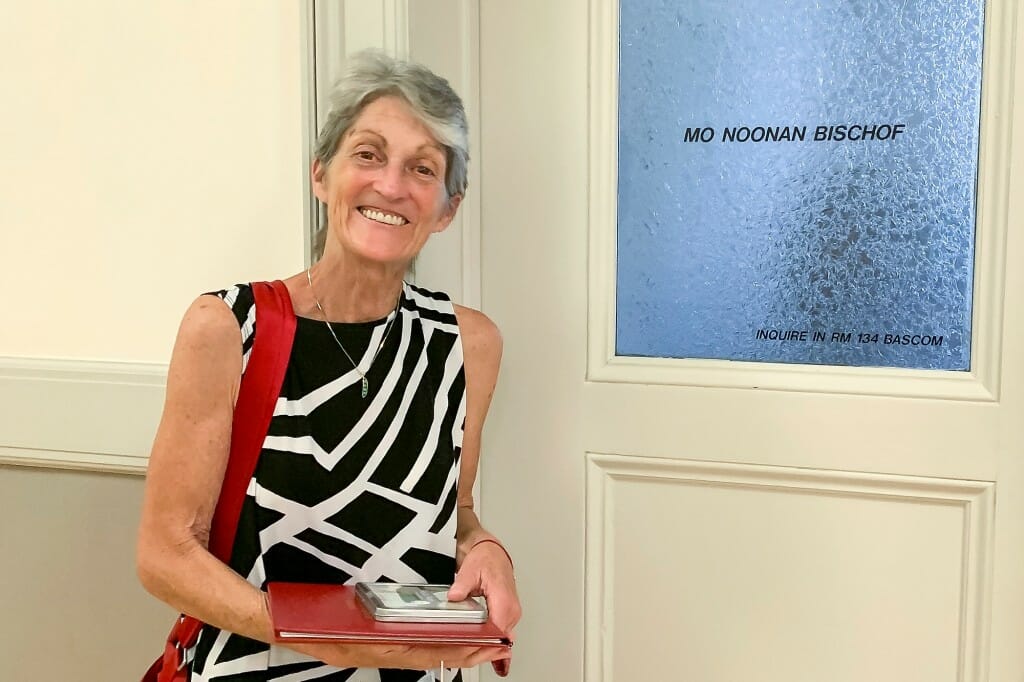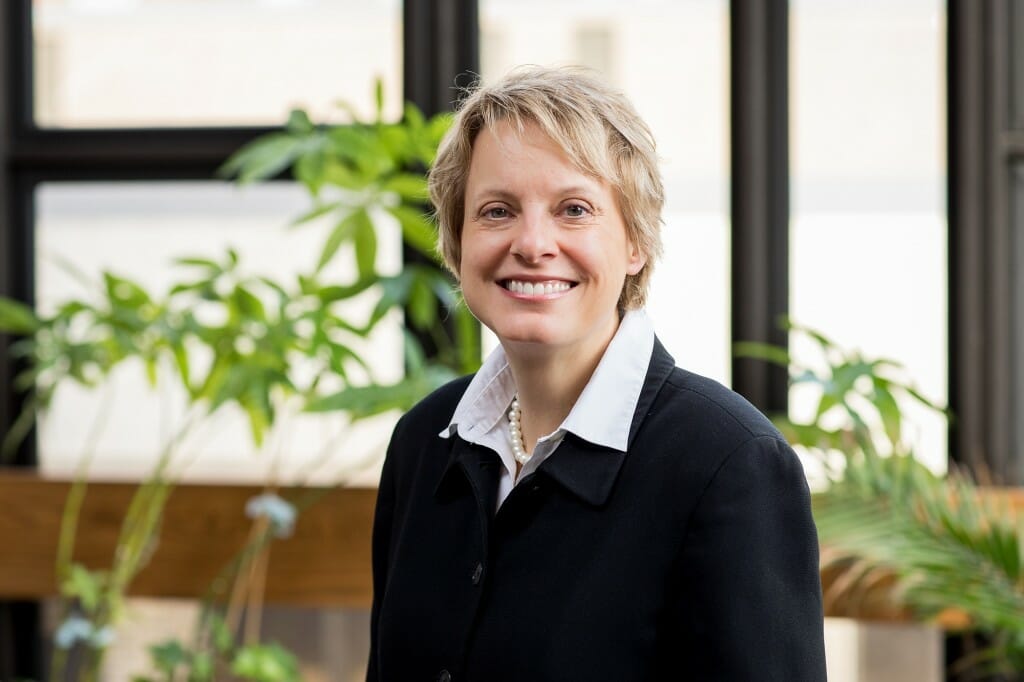Meet the 2022 Academic Staff Excellence Award winners
Each year, UW–Madison recognizes outstanding academic staff members who’ve excelled in leadership, public service, research and teaching. They bring the university’s mission to life and ensure that the Wisconsin Idea extends far beyond the campus and the state. The following 11 employees are recipients of 2022 Academic Staff Excellence Awards.
Chancellor’s Hilldale Award for Excellence in Teaching
Stacy Forster
Teaching Faculty III, School of Journalism and Mass Communication
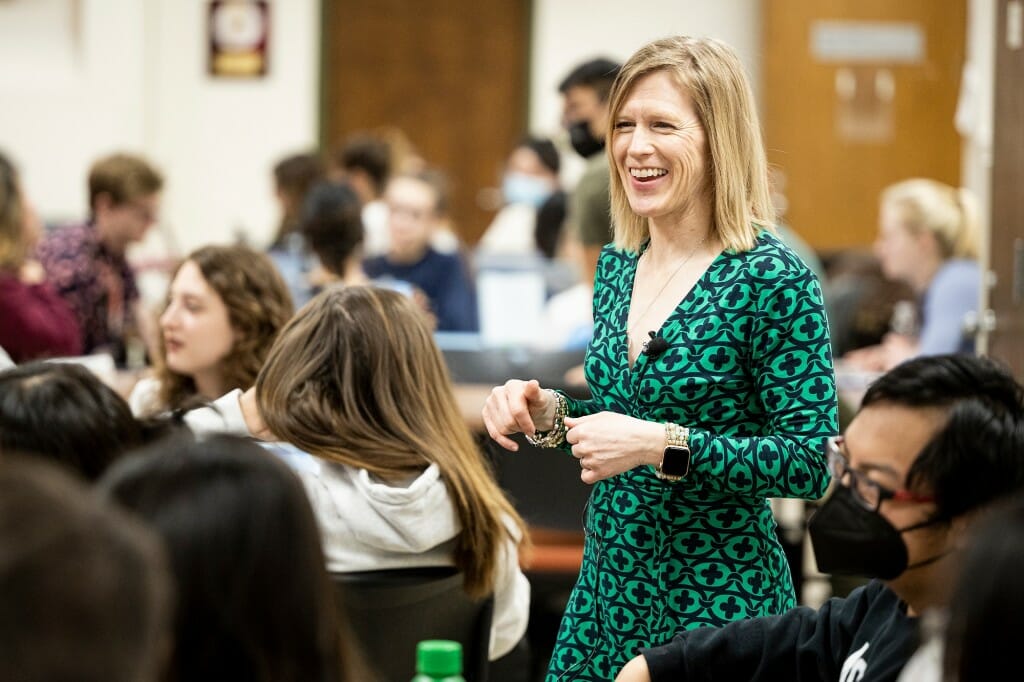
Stacy Forster teaching a Journalism 202 course in Vilas Communication Hall. Photo: Bryce Richter
Journalism 202 demands a lot from its students and its instructor. The six-credit introductory course, a requirement for all majors, thrusts its 100-plus students into six hours of weekly lab work and entails 50 graded assignments. Instructor Stacy Forster surmounts this organizational challenge with great vigor and creativity, continually rethinking the value and delivery of assignments. Students routinely give her such high marks that one colleague calls her teaching evaluations “festivals of five out of fives.”
While Forster has had a big impact on undergraduates, she has also dramatically changed and revitalized the master’s degree program. Since Forster became the program’s director in 2018, interest has grown with her focus on individualized training, professional opportunities, and the recruitment of high-quality candidates.
Forster’s talent with students shines especially bright in the department’s capstone magazine editing and publishing class, which publishes the award-winning Curb magazine.
Chancellor’s Award for Excellence in Service to the University
George Arndt
Professor (CHS), Department of Anesthesiology, School of Medicine and Public Health
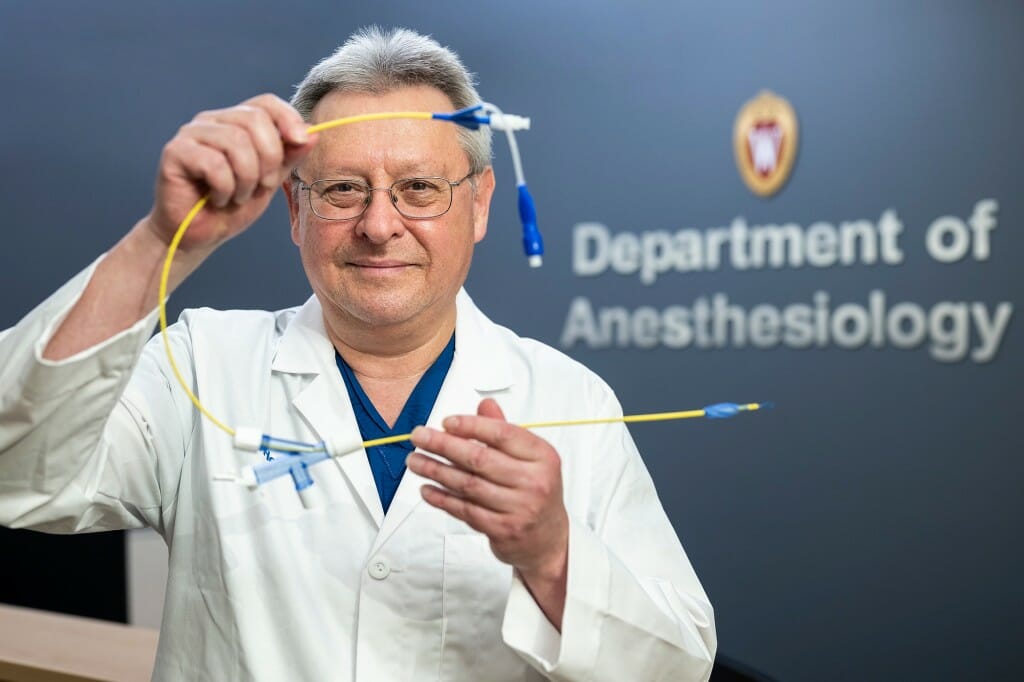
George Arndt holding an Arndt Endobronchial Blocker, which he developed to isolate a patient’s airway during surgery. Photo: Jeff Miller
An accomplished educator, inventor and philanthropist, George Arndt has served as a transformational force in both the practice of medicine and in the lives of numerous Wisconsin students.
With a career focus on clinical innovation and invention, Arndt has profoundly influenced the field of anesthesiology. He is known globally as the developer of devices and techniques that have revolutionized anesthesia management for thoracic surgery and difficult airway access. Among his most famous inventions are the Arndt Endobronchial Blocker Set and the Arndt Airway Exchange Catheter Set.
Arndt and his family have gone above and beyond in their commitment to UW–Madison. The life-changing Arndt Family Scholarship program provides full tuition to minority, first-generation, visually impaired or financially disadvantaged students. More than 100 students already have benefitted. The Anna K. Arndt Professorship, honoring George Arndt’s grandmother, enhances development of early career anesthesiology faculty at UW–Madison.
Chancellor’s Award for Excellence in Research: Independent Investigator
Christine Sorenson
Distinguished Scientist, Department of Pediatrics, School of Medicine and Public Health
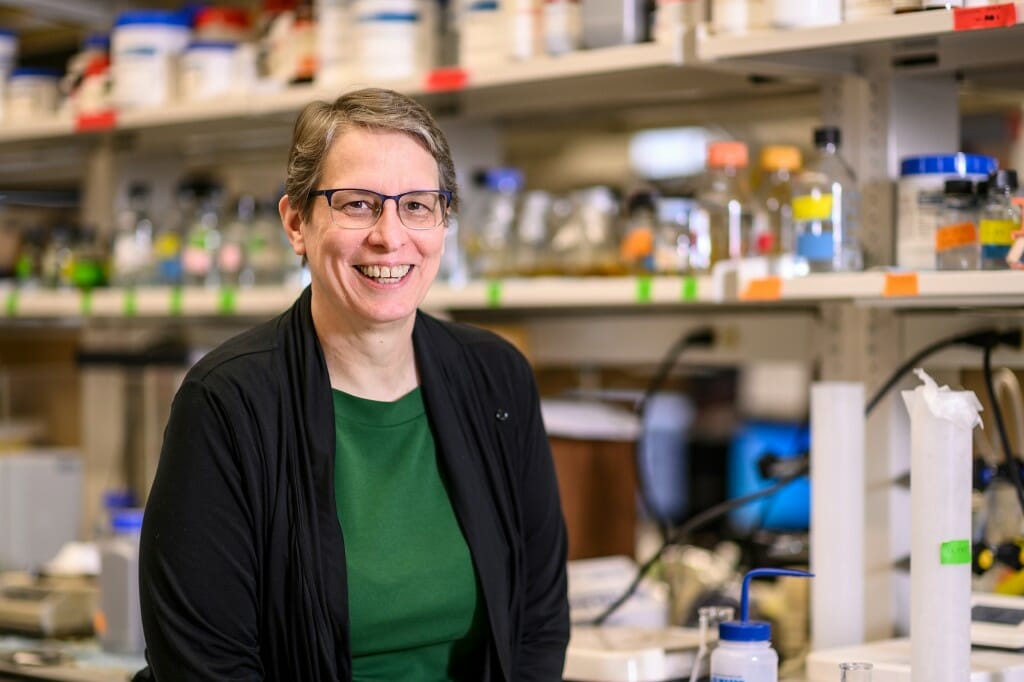
Christine Sorenson at the Wisconsin Institutes for Medical Research building. Photo: Althea Dotzour
Distinguished scientist Christine Sorenson is known for her novel and important contributions to research in preventing vision loss. Specifically, she directs an independent research lab that focuses on the role played by the regulation of apoptosis, a form of cell death, during ocular vascular development and disease.
Sorenson originally trained as a cancer biologist. As a postdoctoral fellow, she turned her attention to the modulation of apoptosis during kidney development. Upon arriving at UW–Madison in 2000, she joined with a strong core of vision scientists to expand her research into eye disorders such as age-related macular degeneration and diabetic retinopathy.
The result: a career lauded for its keen resourcefulness in marrying the fields of cancer biology, renal physiology and retinal disease. Her creative inquiries have uncovered foundational basic biology and conceptual advances and yielded new translational avenues.
Chancellor’s Award for Excellence in Research: Critical Research Support
Changjiu Zhao
Associate Scientist, Department of Integrative Biology
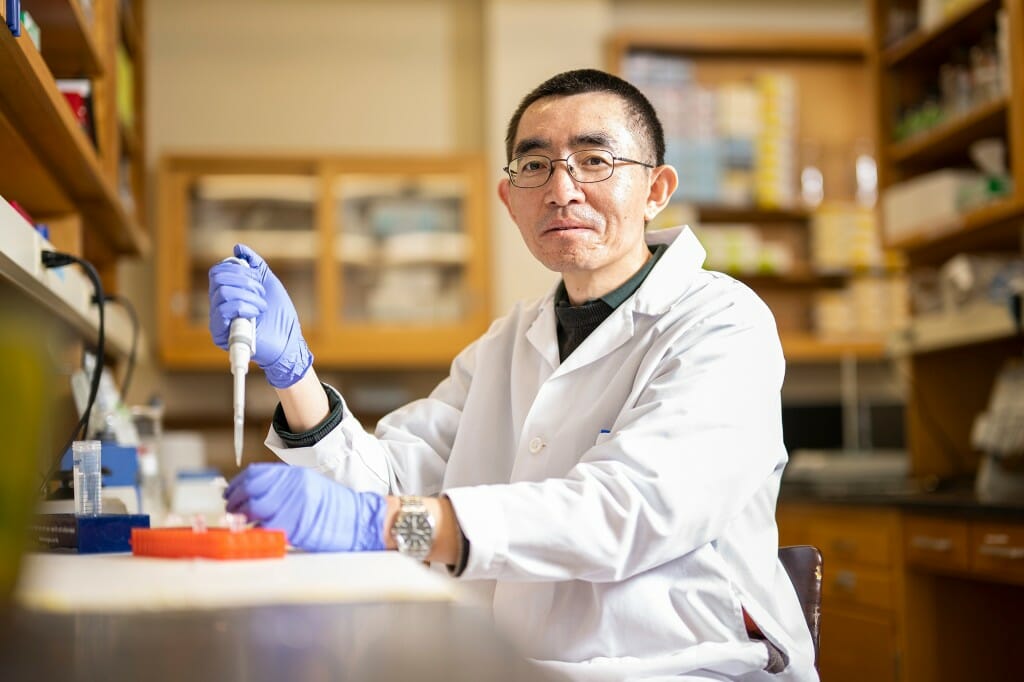
Changjiu Zhao in a lab in Birge Hall. Photo: Bryce Richter
Could the study of social motivation and reward associated with communication in songbirds one day help treat mental health disorders in humans? It’s the latest research question pursued by Changjiu Zhao, a scientist lauded for developing innovative, cutting-edge neurobiology methods, then enthusiastically training others to use them.
Zhao provides critical research support by running numerous projects funded by the National Institutes of Health. He has been instrumental in continuing the behavioral work in the labs of Professor Lauren Riters, where he currently works, and Professor Stephen Gammie, where he focused on maternal behaviors in mouse models designed to understand and alleviate maternal depression in humans.
Zhao shares his knowledge eagerly and widely, helping to advance the careers of new scientists and contributing to the success of established investigators within and outside his department.
Chancellor’s Award for Excellence in Leadership: Individual Unit Level
Isa Dolski
Associate Director, Center for Healthy Minds
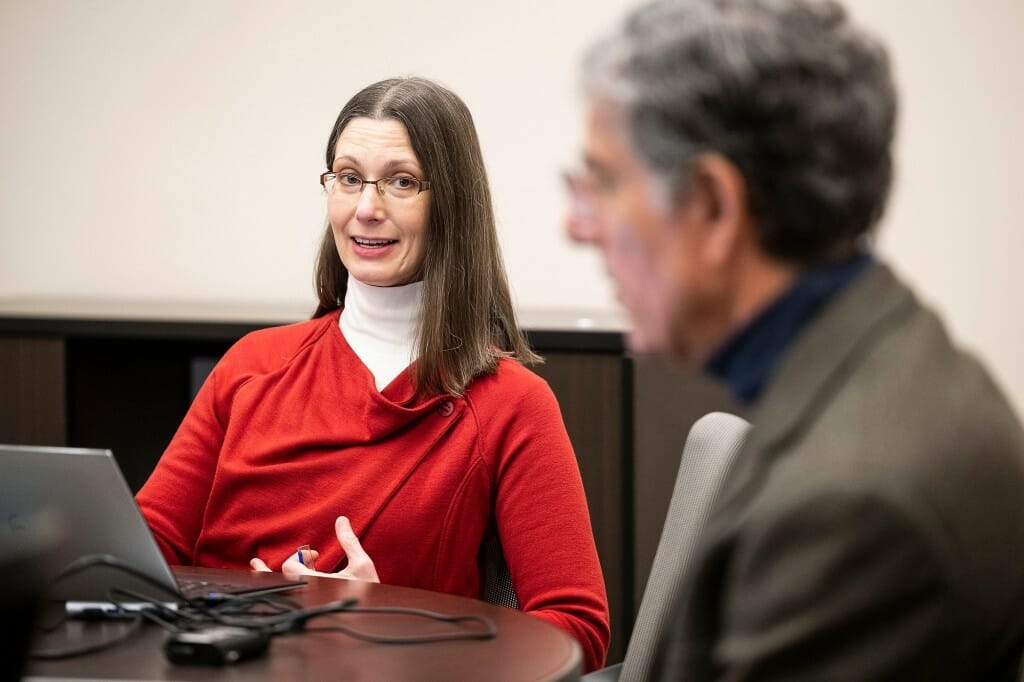
Isa Dolski during a staff meeting at the Center for Healthy Minds with founder and director Richard Davidson. Photo: Jeff Miller
At the globally acclaimed Center for Healthy Minds, one phrase can be heard countless times each day: “I’ll ask Isa.”
Valued as the center’s backbone, Isa Dolski oversees all operational, advancement, financial, outreach and research administration aspects. In 2021 alone, she managed a $7.4 million budget, more than 40 active research protocols, and more than $5.5 million in grants at three facility sites, while also being administratively responsible for nearly 100 employees.
Dolski’s hard work and expert judgment can be seen in many of the center’s milestone developments, from its top-to-bottom reinvention as an independent center located administratively in the College of Letters & Science to the launch of a spin-off nonprofit organization, Healthy Minds Innovations. Over the past two years, Dolski has skillfully led the center through COVID-related challenges while serving as a key leader in the center’s commitment to diversity, equity and inclusivity.
Chancellor’s Award for Excellence in Leadership: School, College, or Larger University Level
Nancy Linh Karls
Co-Director, The Writing Center, Writing Across the Curriculum
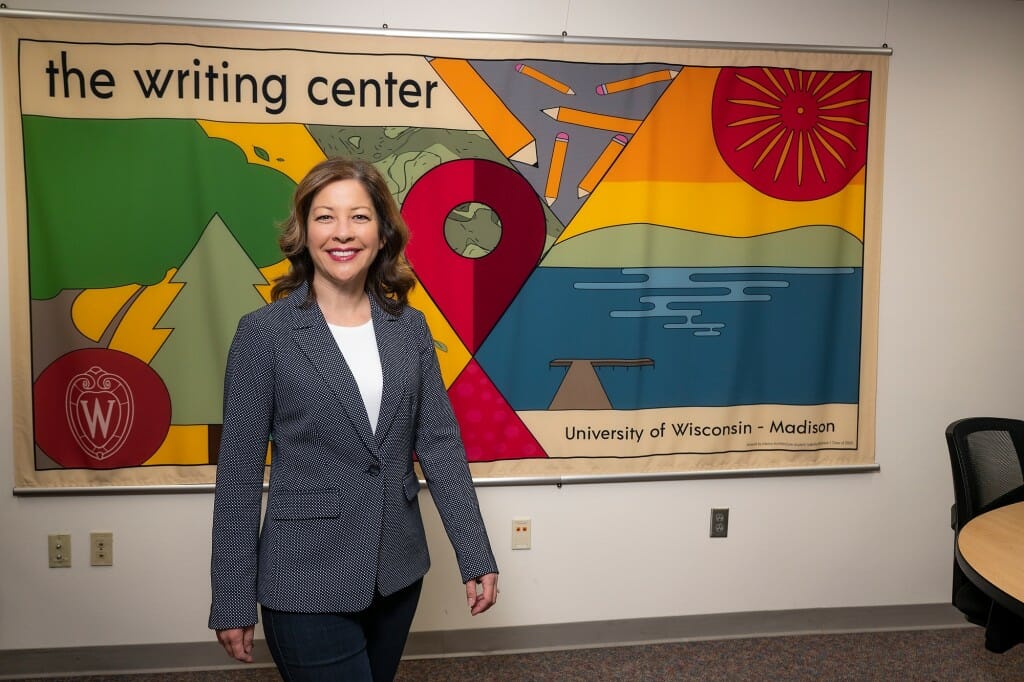
Nancy Linh Karls in Helen C. White Hall. Photo: Althea Dotzour
The superb work of Nancy Linh Karls has improved the quality of writing of students, faculty and staff at all levels of the university. Far beyond campus, she’s made a profound impact through community outreach.
Karls has been part of the core leadership team of The Writing Center and its Writing Across the Curriculum program for 17 years, serving as co-director of both since 2019. Tireless and upbeat, Karls has helped institute best practices in multilingualism and multiculturalism while greatly bolstering the acclaimed center’s staffing and offerings.
Drawing special praise is her longtime leadership of two efforts within The Writing Center, the popular Dissertation Writing Camp for graduate students and the Madison Writing Assistance program. The latter provides free, weekly, one-to-one writing assistance to Madison-area residents at local libraries and neighborhood centers — truly the Wisconsin Idea in action.
Robert and Carroll Heideman Award for Excellence in Public Service and Outreach
Joy Schelble
Youth Development Educator, Division of Extension
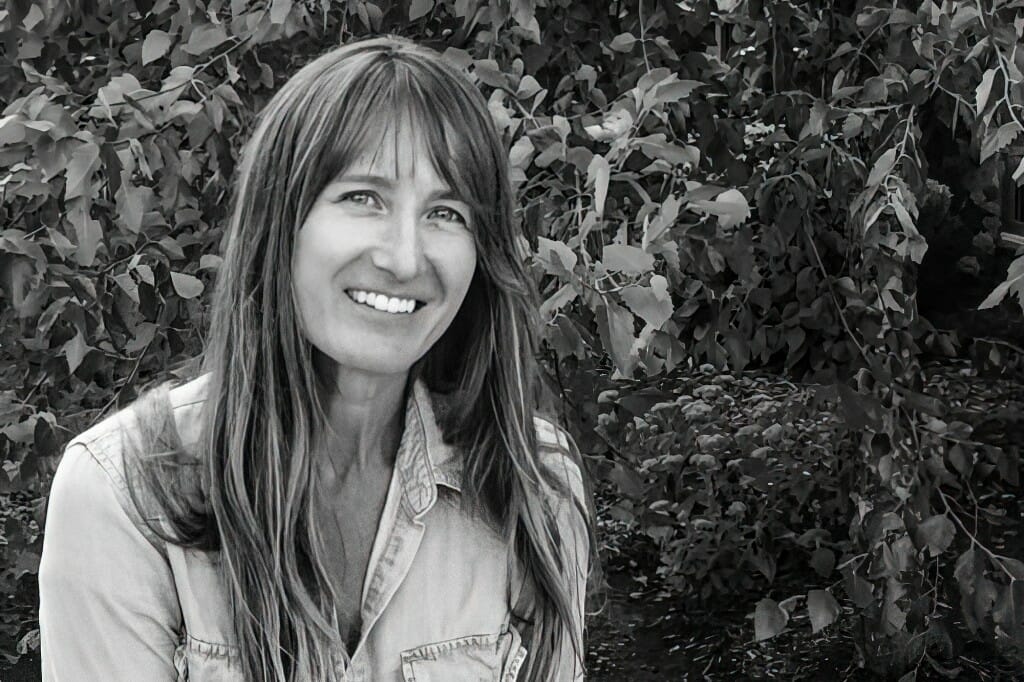
Joy Schelble works with the Bad River Band of the Lake Superior Tribe of Chippewa Indians. Photo courtesy of Joy Schelble
In the forests, rivers, playgrounds and gardens of the Bad River Band of Lake Superior Chippewa, Joy Schelble embodies the Wisconsin Idea.
A highly regarded Extension educator since 2002, Schelble has served the Bad River community for the past seven years. She helps preserve the language and culture of the Bad River Tribe through community programs, especially in the areas of community gardens and youth development.
Endlessly creative and enthusiastic, Schelble works to improve the nutrition and gardening knowledge of the tribe’s youth by involving them in the harvesting, processing, and cooking of traditional Ojibwe foods. She led the construction of greenhouses for the Bad River Tribe and established the programmatic foundations of the Bad River Food Sovereignty program.
An outstanding achievement is her work helping to build a traditional Ojibwe lacrosse program for youth in the area.
Martha Casey Award for Dedication to Excellence
John Koger
Research Technology Manager, Center for Healthy Minds
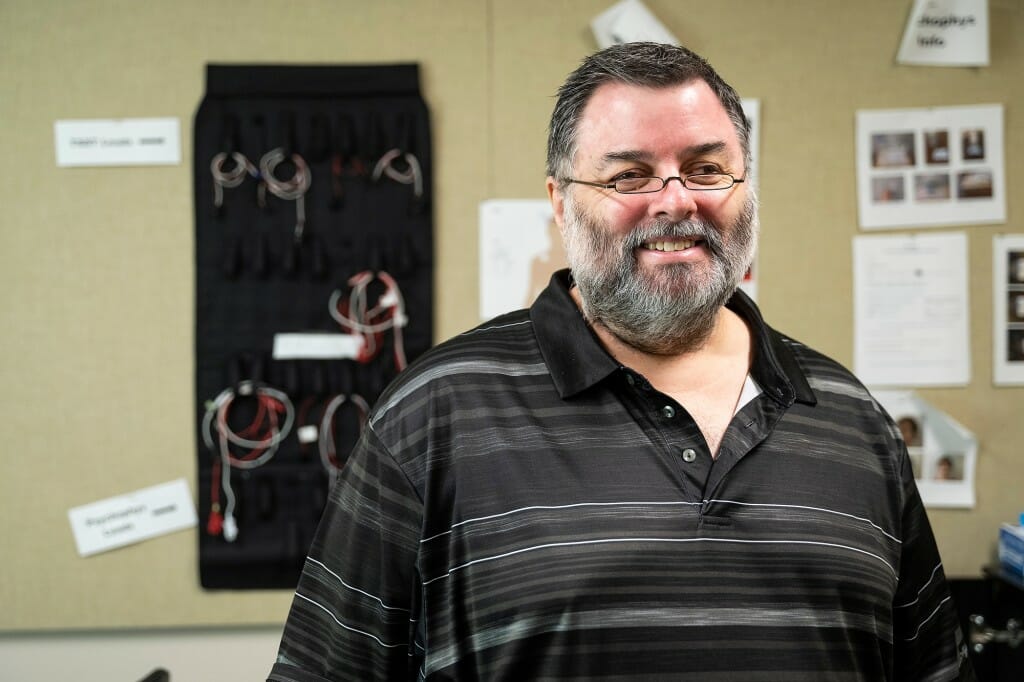
John Koger at the Center for Healthy Minds. Photo: Jeff Miller
Colleagues praise John Koger as one of the folks who puts problems on their back and lifts everything up to make systems work, all while smiling.
Koger has worked behind the scenes for 25 years at several UW–Madison research labs focused on psychology and neuroscience, the last nine years at the Center for Healthy Minds. He has built all forms of software and hardware, taught and mentored scores of people, overseen data collection facilities and software, and answered questions — day or night.
Koger’s co-workers are in awe of his breadth of skills and quiet brilliance. But beyond Koger’s technical achievements, it’s his joy, generosity and compassion that impresses them. He’s possibly “the university’s biggest sweetheart,” as one fan puts it.
Martha Casey Award for Dedication to Excellence
Dale Wilson
Research Services Manager, Sonderegger Research Center
Teaching, Learning, Technology Specialist, School of Pharmacy
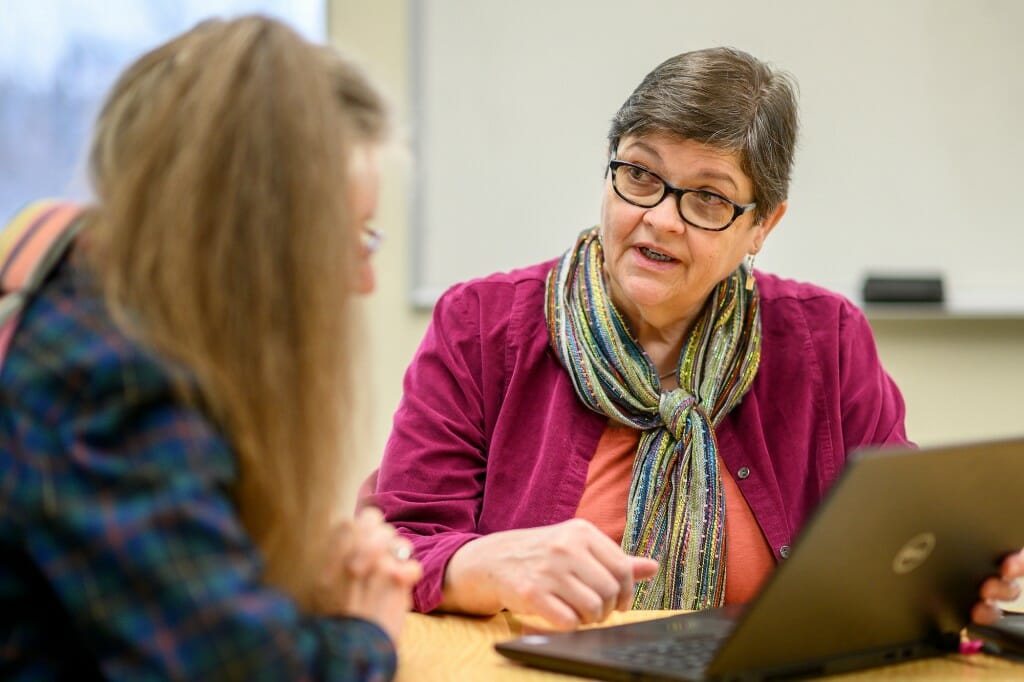
Dale Wilson (right) speaks with professor Betty Chewning in Rennebohm Hall. Photo: Althea Dotzour
Since its founding in 1985, the Sonderegger Research Center has sought to be a multidisciplinary leader in health services research. Dale Wilson gets considerable credit for helping the center reach that goal.
For more than 30 years, Wilson has assisted faculty, administrators and graduate students in all aspects of the center’s work, from developing data collection instruments and maintaining data sets to preparing articles and submitting grants that have brought in millions of federal research dollars. Her colleagues marvel that she’s never missed a deadline or lost her cool.
Additionally, Wilson supports one of the most complicated lab courses on campus. She recruits, schedules and trains 20 “patients” to role-play different care scenarios with 130 students across eight three-hour labs per week for the required course Pharmacist Communication: Educational and Behavioral Interventions.
Ann Wallace Career Achievement Award
Mo Bischof
Associate Vice Provost, Director of Academic Assessment, Office of the Provost
Mo Bischof’s far-ranging contributions to campus cannot be easily summarized. Her reputation can: a brilliant thinker who leads with empathy and positivity.
Bischof, who retired in 2021 after 25 years in academic staff positions, excelled at developing and coordinating campus-wide academic programs, policies and initiatives, mostly through the Office of the Provost. Her enduring imprint can be found on the Educational Innovation Initiative, the Madison Initiative for Undergraduates, the Cluster Hire Initiative, teaching and learning engagements and other professional development programs.
Notably, Bischof helped create, then led, campus-wide efforts to advance direct evaluation of student learning — mission-critical work that brought national recognition. A champion of academic staff members, Bischof served prominently on, and co-led for many years, the campus Personnel Policies and Procedures Committee. Through it all, her greatest asset, many say, was her interpersonal skill — “everybody enjoyed working with Mo,” one colleague commented.
Ann Wallace Career Achievement Award
Brenda Spychalla
Distinguished Information Processing Consultant Emerita, School of Education, MERIT
Before Brenda Spychalla tackled the problem, information technology at the School of Education was decentralized and hard to navigate. By 2008, she and colleague Jo Ann Carr had developed MERIT, a merged media, library and IT unit that is now a model for campus and beyond. From 2015 until her retirement last year, Spychalla served as MERIT’s co-director and as co-chief information officer for the School of Education.
MERIT is just one example of Spychalla’s knack for problem solving and relationship building. During a stellar 27-year career, she delivered high-quality IT services to the School of Education while contributing to numerous campus committees, policy initiatives and shared governance activities, often as a leader.
Her legendary efforts at building community, especially among women in IT, include the co-creation and collaborative leadership of UW–Women in IT and UW–IT Connects and similar work in the Big Ten and globally.
Tags: academic staff, awards

